- Home
- Brian Falkner
The Real Thing Page 11
The Real Thing Read online
Page 11
He didn’t eat the roll that Dennis brought, and he ‘picked up’ the sounds of Tupai eating his, so that he could eliminate them from the universe that surrounded him in the spacious well-foliaged atrium.
LOOSE ENDS
Borkin’s target went down to the basement car park immediately after the special board meeting. The meeting had gone well, she thought.
The parcel containing her recipe had arrived but, after being switched by her target at the entrance to the building, the recipe shown to the board was a fake all right, but not her fake!
The board had made copies of the recipe, before sending Senior Technician Ramirez away with instructions to brew a batch as quickly as possible for sampling. Before the meeting Borkin had wondered how close it would be. It wouldn’t be the real recipe, but it had to seem real.
She saw her target walk past her office at 5:50 p.m., close enough to the end of the day to seem as if he were simply going home. But she knew he wasn’t. She desperately hoped he hadn’t yet twigged the trap she was building.
She radioed quickly to the FBI team and confirmed the description of the car. They would pick him up the moment he left the car park and keep him in sight, informing her of all his stops. And they wouldn’t get noticed. The FBI was very, very good at this kind of work.
Her cellphone rang, and she plucked it out of her handbag tiredly. It had better be important, she thought.
It was. Fraser and Tupai had not arrived back in New Zealand. The flight had arrived, but they hadn’t been on it. There seemed no obvious explanation for it. That caused a chill that started in the extremities of her fingers and spread like iced water through the channels of her body.
Anastasia Borkin expressed her distress by using a phrase she had picked up from the New Zealanders.
‘Bloody hell!’ she said loudly.
Her radio crackled and the FBI had their first report. The target had driven straight to a nearby mall, and used a pay phone in the entrance. He had made a quick call and was now waiting by the phone. She thanked them and put the radio down on her desk.
A pay phone. She mentally played through the possible moves in this chess game. The target must have contacted the kidnappers, and was waiting for them to call him back. The FBI couldn’t afford to pick him up at this stage. Not if they wanted him to lead them to the kidnappers. He would just deny everything. Better to play the waiting game.
The FBI would be able to track down the number he had called, and also the number that called back, although it would probably be another pay phone.
Still they’d be able to narrow it down to the state and hopefully even the city, which would give them a good start. She hoped it wasn’t overseas, because that would make it twice as difficult for the FBI, as they would have to involve local law enforcement authorities in the country concerned.
Even as she was worrying about such a possibility, a call came through from the FBI team. The first call had been to a cellphone number, somewhere in Australia.
‘Bloody hell!’
ON THE SCENT
He finally picked them up just after two o’clock. The first thing he noticed was the perfume, it had a scent that screamed ostentatious wealth, but that, in itself, was no reason to suspect anything. Nor were the clothes, overtly elegant, fashion for people with more money than style. The giveaway was the accents, a nasally New Jersey accent and a laid-back West Coast sound, trained to neutral-American. Two American accents in the foyer of the Corker Cola building: it might mean nothing, but alarm bells were going off in Fizzer’s head.
‘I don’t care,’ he heard a scrap of conversation as they exited the lift. Other people were passing, talking, and he had to really focus to isolate the Americans. The man was speaking. ‘I’ll camp on their doorstep if I have to. I want my money.’
Fizzer silently nudged Tupai. Tupai asked no questions, but casually rose after the pair had passed, and placed his boxing magazine back on the rack.
The woman was talking now. ‘They’re just waiting until all the loose ends are tidied up. You should be more worried about the call from Atlanta. Something must be up. Why else would … ?’ The rest of the conversation was lost as they passed out through the rotating door.
Fizzer remained seated until they had turned a corner outside the building, then got up, speed-dialling Dennis as he did so.
‘Guy with a cream-coloured jacket, woman in red trousers. We’ll follow them on foot, try and keep close.’
They had disappeared into the crowds that were thronging the inner city streets by the time they emerged, and Tupai wanted to race ahead and catch them. Fizzer caught his arm.
‘I’ve got them,’ he said, tapping the side of his nose.
Tupai sniffed the air and looked at him uncertainly. ‘Are you sure?
‘I’m sure.’ That Fifth Avenue perfume was unmistakeable.
Wherever they were going, they were walking there, and they seemed nervous, stopping a lot and looking behind them, pretending to admire things in shop windows while watching the reflections in the glass.
It was basic spy stuff out of a thousand cheap novels and old movies, and it would have been laughable if it weren’t for the seriousness of the situation.
Whatever they thought they were looking for, it wasn’t two teenagers in t-shirts and jeans, and, anyway, they would scarcely have got a glimpse of the pair, as most of the time Fizzer kept right out of sight of them, hidden in the bustling crowd, the congested pavements. He followed them by smell, and it was easy with the strong, distinctive perfume.
Dennis stayed close, circling the block occasionally when forced to by traffic patterns, other times pulling to the side of the road behind them and waiting for a few moments.
It was a warm sunny day and the air was still. That helped the trailing as well, as a breeze could push the scent into wrong directions and lead them up blind alleys, while rain would have brought all sorts of other smells up from the pavements, gutters and drains making it so much harder to stay on track.
When they weren’t stopping and doing their comical ‘spy stuff’, the man and the woman walked swiftly, as if they had quite a distance to cover and not much time. They eventually pulled to a halt in Chinatown, at a long bank of pay phones on the edge of a crowded, bustling, noisy food hall. If you wanted privacy it was the perfect place, as the surrounding hubbub enveloped you like a blanket, smothering you away from any possible eavesdropping.
Fizzer found a free table.
‘Go and order something to eat,’ he suggested.
‘I’ve already eaten.’
‘I know, but it’ll look odd if we just sit here and don’t order any food.’
Fizzer was conscious that the eyes of the man were roaming the room. He was a dark-haired man, in his fifties, and took no notice of two ordinary-looking teenagers having lunch.
The walls of the food hall were grimy, but the stalls themselves looked spotlessly clean. Posters, in all colours of the rainbow, shouted loudly in large Chinese characters. Above each stall, faded pictures of Chinese dishes were taped to lightboxes that had also seen better days. One flickered nearby, as though one of the tubes inside was trying, and failing, to spark into life.
The seats were hard plastic, for easy cleaning, and the table was polished metal, for the same reason. Even so, the tabletop he sat at had the dried remains of at least the last six occupants’ meals, hurriedly wiped over then left to dry.
All this he registered, then eliminated. The aroma of the many varieties of food he ignored, defocussing from his sense of smell and becoming more and more conscious of the sounds that reached his ears. He stilled his own breathing and eliminated that sound. An extended family was arguing in a harsh, guttural Chinese dialect to his immediate left, that too was sent to the background.
Gradually he eliminated most of the hubbub and chatter, including Tupai’s voice behind him, discussing, in Cantonese, various dishes with the owner of a yum cha stand. Fizzer had forgotten that Tupai spoke C
antonese, but didn’t let the realisation interfere with his concentration.
That left him listening to the whir of the fans above the frying vats (eliminated), the clack and clatter of cutlery (eliminated), the sound of banknotes rustling into tills, and, from somewhere, the sharp hiss of running water (both eliminated). Then, finally, the purp, purp of the digits on the pay phone in the booth on the wall opposite.
It was the woman dialling, and her voice, when the call was connected, came to him in tiny morsels, drifting through the clouds of blanked out sounds in his mind. The sound came opaquely, sometimes muffled, sometimes obscured altogether, but always unclear, as if viewed through distant fog.
He would have heard better if he’d sat closer, but that would also have increased the risk of their being noticed.
He was barely conscious of Tupai’s return, or the way he placed the tray of lo-bak-go, ju-chuen-faan, and char-sui bau on the table so quietly as to make no sound at all.
Tupai’s bulk blocked some of the sound from the family next door though, and the conversation on the pay phone crystallised a little more clearly.
The words ‘Coke carton’ came to him along with ‘fake, set-up, and trap’, none of which made any coherent sense. The next bit did though.
‘… clean (missed) fly out to the (missed) make sure (missed) and kill them all.’
THE AIRFIELD
They talked it through in the car as they tailed the man and the woman through steadily firming evening traffic.
The man, Joe, was driving. Fizzer had picked his name up out of one of their conversations. The woman’s name ended in ‘andy’, maybe Sandy or, as she was American, possibly Brandy or Mandy.
Dennis had already tried the police but they had not seemed at all interested. Either that or they simply hadn’t believed him.
No news of the disappearance of the Coca-Cola Three had been made public, so the only hope they had of convincing the police was by persuading them to contact The Coca-Cola Company, and they didn’t want to do that unless absolutely necessary, as they didn’t know who to trust there.
‘If we just stay on their tail,’ Fizzer said, ‘they’ll lead us straight to the missing execs. The three of us should be able to deal with one man and one woman.’
‘As long as they don’t have guns,’ Tupai said.
Dennis said enigmatically, ‘There are ways of dealing with guns’.
‘You’re sure about what you heard?’ Tupai asked.
‘I didn’t hear everything she said, and I couldn’t hear the other end of the conversation, but if I had to put a bet on it, I’d say that something in the US has given them a fright and they’re going to kill the executives and bury the whole operation.’
‘Murder is a pretty serious business,’ Dennis said. ‘They don’t look like murderers to me.’
‘If I’m right, they’d be desperate,’ Fizzer replied. ‘They’re in too deep. Way too deep. And anyway, what do murderers look like exactly?’
Dennis nodded. ‘You’re right, and even if you were wrong, we couldn’t take the chance.’
A few cars ahead, the eye-shaped tail-lights of the blue Mondeo flashed and indicated a turn.
‘Any chance they’ve spotted us?’ Tupai asked.
‘I doubt it.’ Dennis was pretty cool about that. ‘We’ve never been closer than three cars away from them, and there are dozens of cars about like this one.’ As if to prove his point, an identical silver Holden indicated and moved in front of them.
Dennis turned off, following the Mondeo at a safe distance.
Fifteen minutes later the car turned into a long, straight lane leading to a small airfield. Dennis drove past, picking up the name of the airfield from a sign, and got busy on his cellphone. By the time they had allowed some breathing space and doubled back to the lane, he had hired them an aeroplane.
‘It’s a twin-engined Piper Cherokee,’ he told them. ‘Flies like a rocket; we’ll be able to keep up with anything in that, as long as it isn’t a jet. They want cash though. Do you have enough?’
Fizzer nodded, and didn’t feel at all guilty about spending Coca-Cola money. They were on Coca-Cola business after all.
The sound of Joe and ‘Andy’s’ plane was still lingering around the dusty hangars and offices of the charter plane firm as Dennis handed over quite a large stack of Harry Truman’s private money. While filing his own flight plan in the firm’s log-book, he had a good look at the flight plan of the plane that had just left.
‘They’ve filed for Brisbane,’ he said, as they went through pre-flight procedure in the small cabin of the Cherokee. But I bet that’s not where they’re going. They’ll veer off at some point to their real destination. They have a single-engined Cessna. We’ll be able to overhaul them easily in this little baby, but we’ll hang back, pick them up on radar and wait to see where they land.’
‘We don’t want to alert them,’ Fizzer mused. ‘But I guess after they land they’ll lose their own radar.’
Tupai said, ‘We need to be close enough behind them so we can stop what they’re going to do!’
‘It’ll be tight,’ Dennis said, and they were both glad they had him along. He had an air of confidence, of being able to deal with any situation.
The sleek white aircraft took off into the sunset with a throaty roar from its twin engines.
They didn’t speak for most of the flight, there was little to say. They had no plans, and there were none to make, as they had no idea what they were walking into. All they could do was wing it when they got there, and hope they were in time.
‘They’re turning away from Brisbane,’ Dennis said after a while, his eyes on the small radarscope in the centre of the controls. ‘Heading for the Gold Coast.’
The plane showed no signs of landing at the Gold Coast, however, and continued northwards and out to sea.
‘Interesting,’ was Dennis’s only comment. The two boys waited quietly. The Cherokee flew up the coast, not following the Cessna’s flight out across the ocean.
Only after the Cessna circled around once and disappeared from their radar did Dennis yank the controls in that direction. The small plane banked sharply and the darkened beaches of the Australian coast slid away far beneath them, the gnash of the breakers grinning whitely against the dark lips of the shore.
Dennis had noted the co-ordinates at which the Cessna had disappeared, but, even so, it took them a little while to locate the island.
‘There!’ Fizzer called, looking at a smudge of light on the dark canvas of the ocean.
‘Where?’ Dennis asked. Tupai also peered into the distance, not seeing anything.
‘Just follow my hand,’ Fizzer said, aiming with a flat palm in the direction of the light.
Five minutes later Dennis and Tupai saw it too.
The light grew steadily brighter until it became a string of bright pearls on a black velvet pad.
The lights of a vehicle of some kind, just two small pinpricks, were tracing a jagged line away from the small airstrip. The Cessna was a child’s toy, parked on an angle at the far end.
Dennis brought the small plane in on a satin-smooth landing and pulled it up, just off the runway, beside the small Cessna.
They had barely stepped out of the cabin door when there was a revving engine, and bright headlights cornered them against the plane. There was the sound of car doors and two burly shapes were silhouetted against the lights. The dark outline of a holster was visible on each of their hips.
‘This is a private island,’ a voice spoke out from one of the shadows. ‘You have no permission to land.’
THE ISLAND
Clara Fogsworth thought she should have been frightened. Terrified. But she was oddly calm and accepting of the situation.
There had been sounds of a vehicle above, then a rope and harness had appeared at the bottom of the sinkhole, with urgently shouted instructions to strap themselves in.
‘You’re being moved to a new location,’ Candy, the bitter
woman with the sweet name, had called down to them.
But Clara knew it wasn’t true. There would be only one reason for hauling them out of their hole and that was to kill them. The story about the new location was just to make them go quietly, so it would be easier for Joe to bop them on the head, or whatever he was planning to do.
Still she went up in the harness, a winch grinding away above her head. Anything to get out of the cave. And she wasn’t frightened at all now the end was near. Her life was a job well done, and this little hiccup would not change anything.
Joe shepherded all three of them at gunpoint into the back seat of a Jeep, and kept the gun aimed steadily at them, while Candy drove, cursing like a farmhand, down a bumpy, rock-strewn track leading to the edge of the island.
There was a jetty, and a small motorised rubber dinghy tied up alongside. Moored in the still waters ahead was the dark outline of the Turtle Dove.
The large, black shapes loomed ominously in front of the headlights of the Jeep.
‘We had no choice,’ Dennis said, taking a step towards them. ‘We lost all our instruments, and it was sheer luck that we saw your airstrip in the darkness.’
The voice considered that for about half a second, which was twice the amount of time that a man like Dennis Cray would ever need.
‘No way.’ The voice was emphatic and the man’s hand grabbed his weapon. He never got the pistol above waist height. Dennis stepped in close and twisted it out of his grasp in a two-handed cross-over grip to send it spinning out into the blackness beyond the lights of the airstrip.
The other guard went for his weapon as well, shouting, ‘Freeze!’
But the word came out as ‘Fwurgle’ due to his being struck amidships by a runaway locomotive in the shape of Tupai White, who was not only the toughest kid in school, and possibly the world, but also the hardest tackler in the Glenfield Rugby League Under Sixteens. The man went flying back into the bullbars of the Jeep with all the wind knocked out of him and didn’t much feel like moving after that.

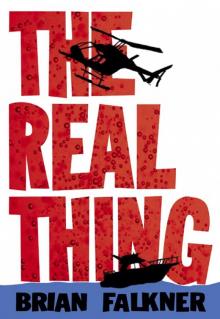 The Real Thing
The Real Thing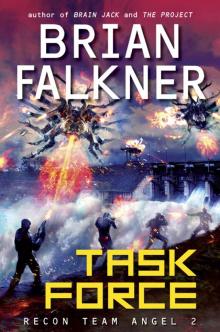 Task Force
Task Force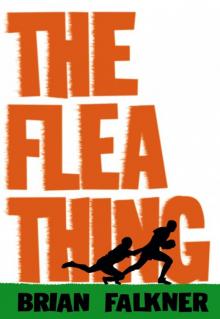 The Flea Thing
The Flea Thing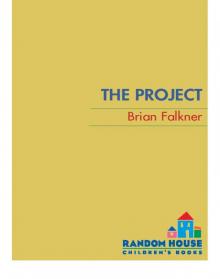 The Project
The Project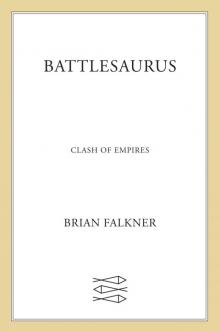 Clash of Empires
Clash of Empires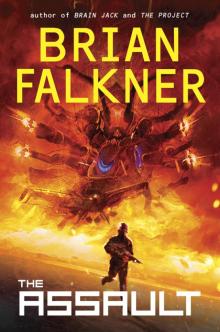 The Assault
The Assault Brain Jack
Brain Jack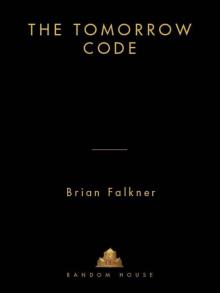 The Tomorrow Code
The Tomorrow Code Vengeance
Vengeance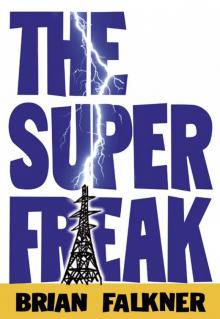 The Super Freak
The Super Freak Northwood
Northwood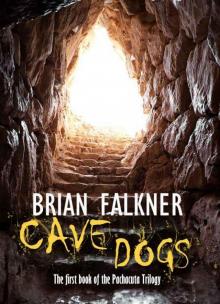 Cave Dogs (Pachacuta Book 1)
Cave Dogs (Pachacuta Book 1)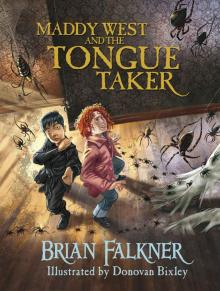 Maddy West and the Tongue Taker
Maddy West and the Tongue Taker